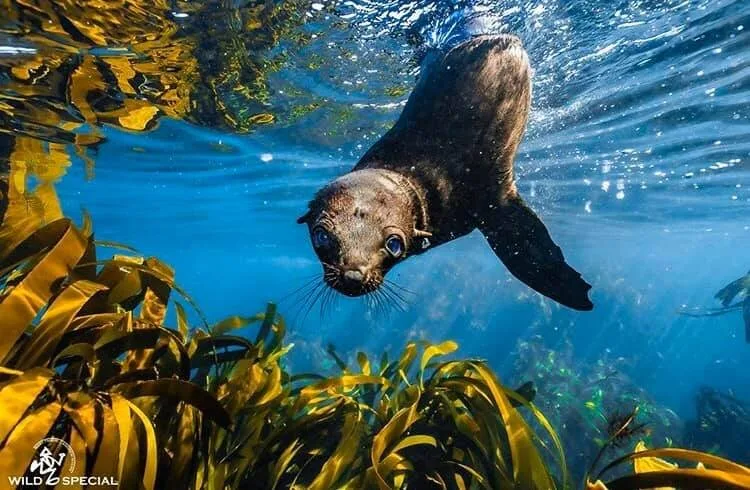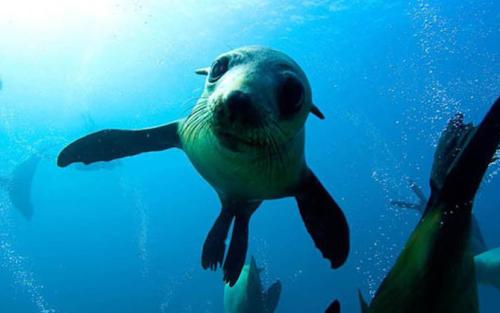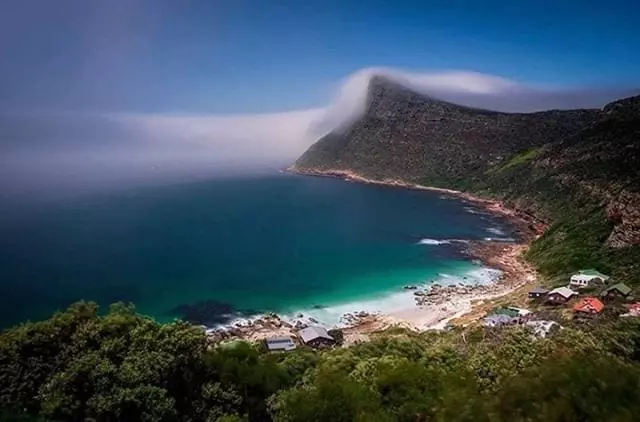Outdoor enthusiasts will find a wide range of unique adventures in Cape Town, South Africa. Seal snorkelling is a thrilling and unforgettable experience here. Swim alongside playful Cape fur seals in their natural habitat, regardless of whether you’re a seasoned snorkeler or a first-timer.
You’ll learn about seal snorkeling in Cape Town in this guide, including where to go, what to expect, safety tips, and cost.
What is seal Snorkelling?
Seal snorkelling is an adventure activity where you get to snorkel in the crystal-clear waters of Cape Town and swim with Cape fur seals. These adorable creatures are known for their playful nature and are curious about swimmers, often coming up close to inspect you. The experience typically takes place in the cold but pristine waters around Seal Island or Hout Bay, and it’s one of the most unique ways to connect with marine life.
Where Can I Go Seal Snorkelling in Cape Town?
Cape Town is home to a few excellent spots for seal snorkelling. Each location offers a different experience depending on the type of seals and the conditions of the waters. Here are the top places to go seal snorkelling:
1. Hout Bay
Located just 20 minutes from Cape Town’s city centre, Hout Bay is one of the most popular spots for seal snorkelling. The nearby Duiker Island, also known as Seal Island, is home to thousands of Cape fur seals, and it’s a great location for both beginners and experienced snorkelers.
- Address: Hout Bay, Cape Town, Western Cape, South Africa
- Social Media: @HoutBayTourism
- Hours of Operation: Tours are available daily, typically between 8:00 AM and 4:00 PM
2. Seal Island (False Bay)
The iconic Seal Island, located in False Bay, is perhaps the most famous spot for seal snorkelling in Cape Town. The island is home to a large colony of Cape fur seals and is accessible via boat. Tours are typically arranged from Simon’s Town, a picturesque town south of Cape Town.
- Hours of Operation: Tours are available daily, typically between 7:00 AM and 3:00 PM
3. Gansbaai
Located around 2.5 hours from Cape Town, Gansbaai is famous for its seal colonies and is a great spot for snorkelling with seals. While Gansbaai is most known for shark cage diving, the region offers incredible snorkelling opportunities with both seals and marine life.
- Address: Gansbaai, Western Cape, South Africa
- Social Media: @GansbaaiTourism
- Hours of Operation: Tours available year-round
My Experience with Seal Snorkelling
I’ve had the chance to snorkel with seals in Hout Bay and Seal Island, and let me tell you—it was an experience I’ll never forget.
In Hout Bay, I joined a small group tour, and we were taken out to Duiker Island on a sturdy boat. Once we reached the island, I could see the seals lounging on the rocks, basking in the sun. The water was cold, but the thrill of swimming alongside the seals made it all worth it. They were so curious and playful, swimming around us and sometimes even nudging us gently. It was both exhilarating and peaceful at the same time.
In Seal Island, the experience was even more magical. The visibility was much better, and the seals were everywhere! We had to wear thick wetsuits, as the water can be quite chilly, but it didn’t matter. Once in the water, I was surrounded by a family of seals, darting through the kelp forest, flipping and diving with such grace. It truly felt like I was in their world.
Is Seal Snorkelling Ethical?
One of the most common questions I get asked is whether seal snorkelling is ethical. The short answer is yes, if done responsibly.
The seals in Cape Town’s waters are wild animals, and interacting with them in their natural habitat can be a highly enriching experience for both you and the seals. However, it’s crucial that the activity is conducted in an ethical manner.
- Respect the seals: Never attempt to touch or grab the seals. While they might swim close to you, it’s important to remember they are wild animals.
- Follow local guidelines: Always choose operators who prioritize the well-being of the seals and the environment. Certified tour operators adhere to ethical standards that ensure minimal disruption to the seals’ habitat.
- Avoid feeding the seals: Feeding wild animals, including seals, can lead to behavior changes and disrupt the natural food chain.

How Much Does Seal Snorkelling Cost?
The cost of seal snorkelling varies depending on the operator, location, and the package you choose. Here’s a general breakdown of prices you can expect:
| Location | Price (per person) | Includes |
|---|---|---|
| Hout Bay | R750 – R1,200 | Snorkel gear, wetsuit, tour guide |
| Seal Island (False Bay) | R850 – R1,500 | Boat ride, snorkel gear, wetsuit |
| Gansbaai | R1,200 – R1,500 | Snorkel gear, wetsuit, tour guide |
Note: Prices are subject to change, so it’s always best to check with operators before booking.
Does Seal Snorkelling Include Transport?
Most seal snorkelling tours in Cape Town offer transportation as part of the package, especially if you’re departing from the city centre. Some tour operators include pick-up and drop-off services, while others may charge a small additional fee for transport.
- For example, tours from Hout Bay typically include transport from Cape Town, while tours to Gansbaai may involve longer transport times, so check the package details.
Are You Guaranteed to See Seals?
While the chances of encountering seals during a snorkelling trip are extremely high, it’s important to note that nature doesn’t guarantee anything. The seals in Cape Town are wild animals, and they come and go as they please.
However, the tour guides are well-versed in the seals’ behaviour patterns and usually know the best times and places to see them. I’ve been on two tours where I saw hundreds of seals within moments of getting into the water. The seals are curious and love to swim around humans, so you’re likely to have a close encounter.
Is Seal Snorkelling Safe?
Seal snorkelling is generally safe when done with a professional tour operator. They provide you with all the necessary gear, including wetsuits, masks, and fins, and they ensure you are briefed on safety guidelines.
- Water conditions: The water in Cape Town can be cold, with temperatures ranging from 10°C to 18°C (50°F to 64°F). If you’re not accustomed to cold water, the wetsuit will keep you warm.
- Guided tours: Most operators have experienced guides who will ensure your safety, both in the water and during the boat ride.
- Wildlife: While the seals are generally harmless, it’s important to be aware of your surroundings. Avoid aggressive or startling movements, and always respect the animals.
When is the Best Time to Go Snorkelling with Seals?
The best time to go seal snorkelling in Cape Town is during the summer months (November to March). The weather is warm, and the water visibility is better. These months also offer the best chances to see seals in large groups as they are more active.
- Best Time: November to March
- Water Temperature: 10°C to 18°C (50°F to 64°F)
However, if you’re looking to avoid the crowds, consider going in the shoulder months of spring (October) or autumn (April), when the weather is still pleasant, and you’ll have a more peaceful experience.
Can You Get Seasick on a Seal Snorkelling Tour?
If you’re prone to seasickness, there’s a chance that the boat ride could make you feel a bit queasy. The waters off Cape Town can get choppy, especially on windy days, but tour operators typically use smaller boats that can be a bit more affected by the waves.
- Tip: If you’re worried about seasickness, consider taking anti-nausea medication before your tour. Also, sit in the middle of the boat to reduce motion sickness.
Can You Touch the Seals?
It’s tempting to reach out and touch these adorable creatures, but touching the seals is not allowed. The seals are wild animals, and disturbing them can harm their natural behavior. The ethical way to experience the seals is by observing them from a safe distance.
How Long Does the Tour Last?
Seal snorkelling tours typically last around 2 to 3 hours. This includes the boat ride to the location, the snorkelling session (which usually lasts around 30 to 45 minutes), and the return boat ride.
What if the weather is bad?
Weather conditions play a significant role in seal snorkelling tours. If the weather is too rough or visibility is poor, most operators will reschedule the tour or offer a refund. It’s always a good idea to check the weather forecast before booking your tour and to confirm with the operator if conditions are uncertain.
Do I Need to Leave a Tip?
While tipping is not mandatory, it is always appreciated by guides and crew members who go out of their way to ensure you have a memorable and safe experience. A tip of around R50 to R100 (per person) is typical.
What Do I Need to Bring?
Here’s a list of what you need to bring for your seal snorkelling adventure:
- Swimwear (for under the wetsuit)
- Towel (for after your snorkel)
- Sunscreen (even on cloudy days)
- Seasickness tablets (if you’re prone to motion sickness)
- Waterproof camera (to capture the moment)
- Personal identification (if required)
Is Snorkelling with seals worth it?
Absolutely! Snorkelling with seals in Cape Town is an experience like no other. Not only do you get to swim alongside one of the most playful and curious creatures in the ocean, but you also have the chance to explore beautiful underwater ecosystems. It’s an adventure that connects you with nature and leaves you with unforgettable memories.
Final Thoughts
If you’re looking for an adventurous and unique experience in Cape Town, seal snorkelling should be at the top of your list. It’s safe, ethical, and thrilling, offering you the chance to swim with seals in their natural habitat. Whether you’re an experienced snorkeler or a first-timer, you’re bound to have an unforgettable time!
For more information, you can check out Cape Town Tourism for the latest updates and recommended operators.
Happy snorkelling!
Frequently Asked Questions (FAQs)
- How cold is the water for seal snorkelling?
- The water temperature ranges from 10°C to 18°C (50°F to 64°F), so you’ll need a wetsuit, which is provided by most operators.
- Are there any age restrictions for seal snorkelling?
- Most tours require participants to be at least 10 years old. However, it’s best to confirm with the operator for age-specific details.
- Can I take my own snorkel gear?
- Most operators provide all necessary gear, but if you’re more comfortable with your own equipment, check with them beforehand.
- Do I need to be a good swimmer?
- You don’t need to be a professional swimmer, but basic swimming skills are required. The guides are always there to help if needed.







